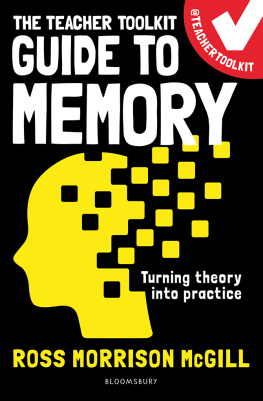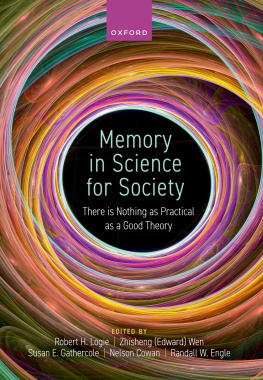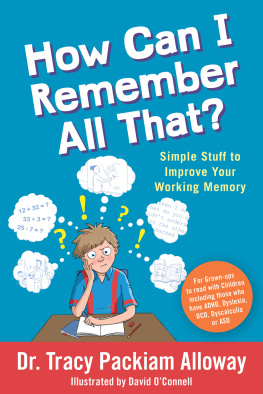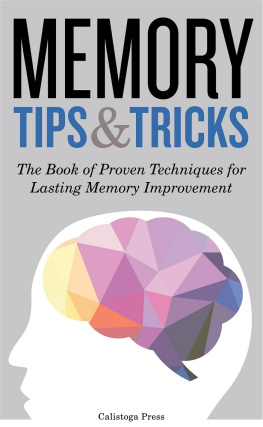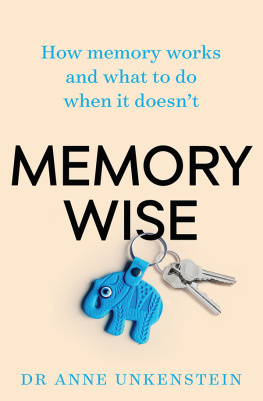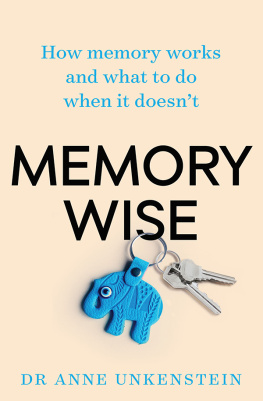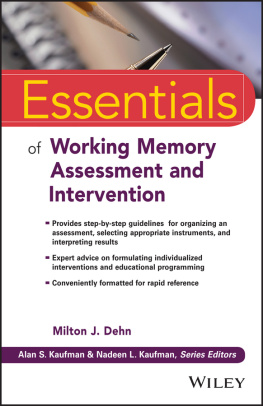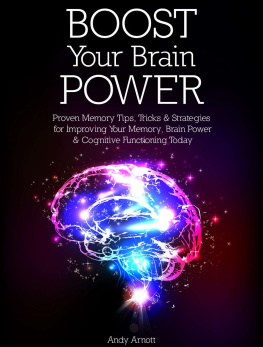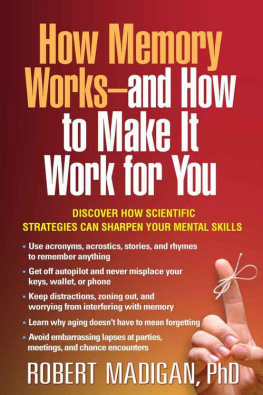PRAISE FOR THE TEACHER TOOLKIT GUIDE TO MEMORY
We are constrained by our memory skills, especially for students sitting in a class bombarded by facts pressured by an upcoming test, struggling to find relations between ideas and building coat hangers to remember the details, and surrounded by others who seem to find it easy to recall what the teacher said. This book is Masterful, Evidence-based, Memorable, Operational, Readable, and the best book for You on memory.
Professor John Hattie, Melbourne Graduate School of Education
The Teacher Toolkit Guide to Memory is a real treasure box for teachers and parents. Packed with accessible information, backed up by research, this book keeps on giving. The practical examples, rooted in classroom practice, will be something teachers can go back to. QR codes with downloadable templates are the icing on the cake!
Louise Sugden, teacher and MAT lead, @Louiseab72gmai1
Being research-informed is one thing; having time to do it is another. Solve both issues by reading and acting upon this excellent introductory guide to the theory and practice of memory. Highly recommended.
Dr Paul S. Ganderton, education consultant, @ecogeog
Ross McGill has managed to beautifully execute and simply explain the fundamentals of cognitive learning and the importance of understanding the how in the context of the brain, complete with wonderful illustrations perfect for the classroom teacher, learner and parent. So, no matter who you are, no matter how successful, no matter how much you already may understand about this topic, Ross has something to offer you.
Victoria dos Santos, assistant athletic director and pastoral lead
In my work as a psychologist in schools, staff often tell me about children who have difficulties with retention. I can now imagine myself recommending this book as a good starting point. Ross has provided an easy-to-access overview of research into memory, as well as an exploration of pedagogy. He has provided practical tips based on concepts from cognitive science and neuropsychology while also incorporating the social and emotional processes which are an integral part of the learning process.
Dr Jo Taylor, child and educational psychologist, @jgetaylor
The Teacher Toolkit Guide to Memory not only provides concrete, easily implementable teaching strategies, but gives a detailed and clear overview of the intricacies of the human brain. I cant wait to apply this knowledge in the classroom.
Larissa Gibb, deputy head of science
This text is long overdue! How can it be that teachers are not taught how their students learn, and how to make that learning stick? This book includes just enough technical information, providing educators with the cognitive and neuroscience research that will be useful and meaningful to them. Thank you for sifting through and translating the research to present practice-based knowledge and strategies necessary to facilitate evidence-based instruction.
Sarah Oberle, first grade teacher and doctoral student (education leadership and cognitive sciences)
An impressive collection of findings that draws on the latest research within cognitive science and education. Ross succinctly discusses, clarifies and offers practical, research-informed examples for busy leaders and teachers.
Mark Leswell, research lead
The human teacher first meets the science. A clear and practical guide to debunking teaching practices, with excellent use of analogies and ideas to support teacher development.
Samantha Torr, Vice Principal: Director of Alpha Teaching School Hub, @alpha_tsh
A fantastic book that successfully interweaves the breadth of cognitive theory and practical strategies in a clear and accessible way. A great book to begin understanding the science of learning and the complexity of influences on this.
Sarah Benskin, assistant principal (teaching & learning, curriculum & CPD), @drblearning
An exceptional effort of presenting the vast and difficult topic of the learning brain in a practical and understandable way.
Yves Moerskofski, educational psychologist
In this wonderful teacher toolkit, Ross Morrison McGill advocates for more active learning opportunities in all our schools. As a cognitive psychologist, I fully endorse the idea that to stimulate thinking, youve got to keep moving.
Dr Peter Lovatt, author of The Dance Cure, @DrPeterLovatt
This book is informative and accessible for quick reads. The consistent approach to each chapter works really well, especially for utilising the practical applications. The embedded use of diagrams adds to the readers understanding of some complex concepts.
Charlotte McLean, SENCO and senior leader
BLOOMSBURY EDUCATION
Bloomsbury Publishing Plc
50 Bedford Square, London, WC1B 3DP, UK
29 Earlsfort Terrace, Dublin 2, Ireland
This electronic edition published in 2022 by Bloomsbury Publishing Plc
BLOOMSBURY, BLOOMSBURY EDUCATION and the Diana logo are trademarks of Bloomsbury Publishing Plc
First published in Great Britain, 2022
This edition published in Great Britain 2022 by Bloomsbury Publishing Plc
Text copyright Ross Morrison McGill, 2022
Illustrations copyright Shutterstock, 2022
Ross Morrison McGill has asserted his right under the Copyright, Designs and Patents Act, 1988, to be identified as Author of this work
Bloomsbury Publishing Plc does not have any control over, or responsibility for, any third-party websites referred to or in this book. All internet addresses given in this book were correct at the time of going to press. The author and publisher regret any inconvenience caused if addresses have changed or sites have ceased to exist, but can accept no responsibility for any such changes
All rights reserved
You may not copy, distribute, transmit, reproduce or otherwise make available this publication (or any part of it) in any form, or by any means (including without limitation electronic, digital, optical, mechanical, photocopying, printing, recording or otherwise), without the prior written permission of the publisher. Any person who does any unauthorised act in relation to this publication may be liable to criminal prosecution and civil claims for damages.
A catalogue record for this book is available from the British Library
ISBN: 978-1-4729-8934-5 (PB)
ISBN: 978-1-4729-8933-8 (eBook)
ISBN: 978-1-4729-8932-1 (ePDF)
To find out more about our authors and their books please visit www.bloomsbury.com where you will find extracts, author interviews and details of forthcoming events, and to be the first to hear about latest releases and special offers, sign up for our newsletters.

CONTENTS
BY PATRICE BAIN

To Jenni and Freddie who, at home, now think its hilarious that I forget things. I do wonder if this book title will see me receive a lifetime of jokes for being forgetful! On that note, if I did publish a follow-up to this book, it would be on why and how we forget. Theres plenty of research on the brain, memory and remembering, but its a little harder to find out why we are

